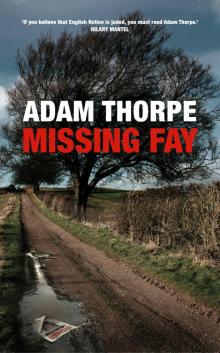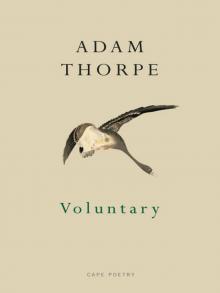- Home
- Adam Thorpe
Between Each Breath Page 10
Between Each Breath Read online
Page 10
‘It’s OK,’ Kaja said, peeling off her dress. ‘It’s Kadri, my aunt. She always goes chatting for really long.’
She was very slim in her white underthings, which she thought she’d better keep on.
She sat on one side of the bed, her feet on the floor, and I kneeled down and went into her hurriedly as she held me, guiding me past the seamed cotton edge of her slip. The window was open and the cold air gusted in over my back. Through the thin walls we heard Kaja’s mother put the phone down and move about. There was no lock on the door. A little china squirrel on the windowsill held up its paws, as if begging us to stop. Kaja had me gripped and her breath was roaring straight into my ear and I was very close. I did, in fact, love her! I really really loved her!
If Maarje were to barge in and see us there – my underpants straddling the bottom of my thighs, Kaja’s feet planted wide apart and up on their toes, her bra’s cups dark and wet from my mouth (the dull taste of cotton on my tongue, with a chemical hint of fabric softener), she would have to approve, because I loved her daughter so much. And her daughter loved me so very, very much, especially (she was whispering, now) when I was filling her up inside with my lovely warm release.
But Maarje didn’t come in. Kaja bit her lip to stop herself shrieking, although her breath in my ear was the crash of enormous breakers, running their white knuckles over the sand very fast. Then she lay back on the bed with me against her, and she said she was so glad that we had each other and knew each other, and I wasn’t sure whether she meant this in a colloquial, sexual way or was completely innocent of the two verbs’ other meanings, and I was very keen to break away from her and get dressed before we were discovered.
And if we were discovered – who knows? Maybe the father would kill me … although Mikhel didn’t seem a violent man.
She wouldn’t let me break away. She held me tight against her and she was smiling mischievously. The last leaves had been clinging to the tall birch in front of the dacha, that blowy morning, and I had pointed this out – and she had said, quoting a famous Estonian poet she had wanted to translate: ‘Or the birch is holding onto its leaves.’
I felt my knob slip out of her and shrivel up, resting in the dense, licheny muff of hairs: it was caught slightly painfully by the edge of her pants, so I adjusted myself by wiggling my hips a little. She thought I was trying to escape and gripped me tighter around the waist, locking her hands on her own forearms either side.
‘Haare,’ I said.
‘Yes.’
Her belly was very hot, and I wondered about her claim that she took the Pill, and about the madness, this time, of not protecting myself. It was the only time I had not protected myself. She might have been infected with HIV by a drunken sailor in Tallinn; she might have slept around a lot before I came along. She might bring men home all the time, although I very much doubted it. But then, a very prim-looking flautist called Marilyn Prindle once had seven one-night stands in a week, a few years back. I know because she told Howard and he told me.
I lay there, thinking really contemptible thoughts with my cheek squashed against her breast, against the broad, dark brown nipple that reminded me of bruised windfalls under the allotment’s apple tree. I was shrivelled to very little by now, and it was too late. I would have liked to have gone to sleep like this, as we would have done in my bed in the low-eaved dacha. I would have liked to have slept and then woken up again and padded with her to the shower in the dacha, with its shuddering and its groaning from the pump or the pipes. I would have liked to have soaped her very intimately as she laughed, holding the cake of soap in her hand and laughing; or fired the sauna and sat her down on my lap – pulling her to me from behind on the hot bench, so my cheek could rest against her straight spine, my fingers spreading wide on her thighs, on the solid roundness of each thigh, and squeezing gently.
But I was in the family apartment with its small rooms and wafer-thin walls, and her mum was audible in the kitchen, now, maybe about to come in and offer us a cup of black tea.
THREE
‘Look at Jack, for example,’ said Milly’s mother. ‘He’s put on a bit, hasn’t he? He used to be an ectomorph of the first order. Or is it endomorph?’
‘He? Who’s he?’ said Jack.
‘Haven’t you, come on – confess!’ glared Milly’s mother, who had drunk too much gin before the meal.
‘It’s all those wine gums,’ laughed Milly touching Jack’s hand.
‘Wine gums?’
‘Yes, Mummy. He can’t compose unless he has a packet of wine gums open in front of him.’
‘How very tame of you,’ said Milly’s mother.
‘Better that than a bottle of Scotch,’ said Milly’s father from the far end of the table, beyond the candlelight, in his deep bass growl.
Jack smiled. ‘Who said I don’t have a bottle of Scotch as well?’
‘Oh, you wicked boy,’ shrieked Milly’s mother, who started flirting with her son-in-law only when she was sufficiently tanked up.
‘The question is,’ said Milly’s father, snorting through his nose before the joke was made, ‘are the wine gums necessary to the composition, or the composition necessary to the wine gums?’
Nobody took any notice. He was regarded, even by his own family, as an adorable bore. He made no secret of his baffled amusement in the face of his son-in-law’s music.
‘What’s your favourite composition?’ Milly’s mother asked, staring at Jack over the table in earnest. ‘Of yours, I mean?’
‘Well, you know what they say,’ said Jack. ‘The next one to be written.’
‘That’s evading the issue,’ said Milly’s mother, helping herself to the burgundy.
‘Don’t slop it in, Mummy.’
‘I’m not slopping it in. It’s liquid. Of course it goes in like that.’
‘Can’t take her anywhere,’ said Milly’s father.
Milly’s mother had been very ill with cancer a year or so ago but had made a miraculous recovery. No one had expected her to live more than another two or three years. Her drinking had worsened as a result. She put her mouth to her glass and sipped, gazing at Jack as she did so. Jack was very fond of his mother-in-law because he always saw in her the young, bright, wasted deb of the immediate post-war years.
‘Come on, confess.’
‘Confess what, Marjorie?’
‘Which one you prefer? You must have one, out of all that noise, that lies closest to your heart.’
‘You are rude, Mummy.’
‘Does Jack good,’ said Milly’s mother. ‘You’re far too nice to him, like everyone else.’
‘Well, he’s nice to me, most of the time,’ said Milly, a little too sing-song.
‘What about that weird thing you wrote in Somalia?’
Jack frowned. The wine had settled pleasantly in his head. He was fond of his in-laws and it saddened him to see how old they were getting, manfully keeping decrepitude at bay. ‘Somalia?’
‘Ethiopia,’ Marjorie corrected herself. ‘Wherever. Something like that. You know. Something that sounds like estragon.’
‘That’s French for sage,’ said Milly.
‘And a character in Waiting for Godot,’ said Jack.
‘Saw that when it first came out,’ said Milly’s dad, which surprised them all. He returned their surprised stares with a nod. ‘Extremely impressive.’
Jack felt a warmth of affection creep through him. There were these sides to people you never suspected, hidden from the daylight.
‘You lucky beggar,’ he said.
‘I’m sure you didn’t,’ said Milly’s mother.
‘I did,’ said Milly’s father. ‘I was a young man in town with nothing to do.’ He looked noble, suddenly, beyond the candlelight. ‘A long time ago now.’
‘Latvia,’ said Milly’s mother. ‘Nothing to do with Ethiopia. When Milly first knew she was preggers.’
There was a general intake of breath and then a silence that sang of dread, of half-hid
den or obscured things in bogs.
‘Estonia,’ Milly said, smiling gamely.
‘Well, that’s what I meant,’ said Marjorie, apparently oblivious of the pain she had thrilled. ‘That piece called something very long and daft.’
‘A Filing Cabinet on Fire in the Middle of the Street, with Caged Fox,’ said Jack.
‘That’s showing off.’
‘I know,’ Jack smiled.
‘I suppose you dreamt it.’
Jack hesitated. ‘Yes, I suppose I did.’
‘You don’t seem very sure.’
‘I probably dreamt it. Or dreamed it up.’ He realised he was blushing. Milly was looking at him, he thought, with curiosity. ‘It was this very vivid picture. Maybe I saw a picture of it, burning.’
‘And the poor old fox in a cage?’ asked Milly’s father.
‘And the fox in a cage. Dreamt that too.’
‘It’s all so casual,’ said Marjorie, with sudden venom. ‘That’s what art is, these days. Casual. In my day it was about something. Love or war or nature or … death.’
‘I agree, Marjorie,’ murmured Jack, who was in no position to explain the truth.
‘Who’s for pudding?’ Milly called out, bird-like, as if there were other tables full of people. But it was only them.
‘We’re still on the red,’ said Milly’s father.
‘We can take it up again for the cheese,’ said Jack.
‘But I brought you the ’88 Fitou for the cheese,’ said Milly’s father.
‘You mean that as a three-line whip?’ grinned Jack, feeling irritated by this.
‘I’ll bet that’s your favourite piece, anyway,’ said Milly’s mother, jabbing a finger at him on which a fat, deep blue sapphire winked.
‘Not really,’ said Jack, beginning to stack the plates from a half-seated position. Milly’s mother raised her hands each side of her face to let him take her plate. In the low, uncertain light she looked as if she was horrified.
‘Let’s finish off the wine before that, then,’ said Milly.
‘Whatever,’ said Jack.
‘Don’t sound cheesed off,’ said Milly, whose eyes were elsewhere, deeply into their own realm of pain and hurt. They kept doing this, but no one other than her husband ever seemed to notice.
‘I’m not in the slightest bit cheesed off,’ said Jack, who certainly was.
‘Why don’t you let the maidservant do this?’ Milly’s mother called out, as Jack was taking the plates into the kitchen.
‘We haven’t got a maidservant,’ he heard Milly explain. ‘She’s just a home help over here from Venezuela to learn English.’
‘That’s what they all say,’ said Milly’s father. ‘Then they blow you up.’
Through the hatch and into the kitchen came the sound of laughter. Jack rinsed the plates before stacking them in the dishwasher. It was dark outside, but beyond his own reflection he could see the trees of the Heath shifting in strong gusts of wind against a paler night sky. He loved Milly so deeply it was an ache, but he knew this love was made up to strength, as cement is by sand, with pity.
With a pinch of guilt, too. Milly’s mother was right, as she usually was in her messy, instinctive, cruel way: his favourite piece was the piece he wrote in Estonia, six years back. Six years! The Dome was a disaster, the Winds for the New Europe project replaced by a celebrity crooner – not quite Elton John – and his piece eventually premiered at the Aldeburgh Festival a year and a half later. He’d changed the name from Echo to the long ‘daft’ one and rejigged it into something more challenging, but it was essentially the same.
The piece had initially moved him, on hearing it being played in public for the first time. A smoke pellet in a burned-out filing cabinet centre stage had made playing a little trickier for the oboists, while the balalaika players right at the back of the auditorium had irritated, apparently, the highest rows by drowning out the music on the stage. It had been performed in the great barn at Snape Maltings, of course. The only place to sit was in the middle, where he and Milly and the in-laws and his parents and a few friends were positioned. He had started crying when the oboes and the voices had begun to merge with the balalaikas. He hid his tears with discreet movements of his fingers. Milly had given him one of her dazzling smiles in support.
Arvo Pärt, who was present only because his own work was being premiered the following day, sat in the row in front, dressed in a long, brown raincoat like a seedy French detective. He’d leaned forwards, a thumb buried in his huge dark beard, his bald head shining above the long hair, hunched and concentrated. He was all elbows, a lot thinner than Jack had expected, and kept nibbling the ends of his long fingers, too restless for an Old Testament prophet. His wife sat next to him, looking owl-like behind huge spectacles. She often spoke for him in interviews, and Jack was more nervous about what she might say than of Pärt himself. When the smoke started settling over the audience in a thin blur and she began to cough tubercularly, Jack knew he’d got what he deserved; Pärt and his wife slipped out with the help of an attendant – a far more interesting sound event, apparently, than anything on stage. Milly squeezed his hand as if comforting a relative at a funeral.
Jack took a bow afterwards and then, once the clapping had subsided and the house lights had gone up, surveyed members of the audience from the side. Among the silvery, distinguished heads there was a lot of winking, a lot of confiding of patient fortitude with thin-lipped smirks, provoking a subtle mirth in the others.
In other words, they were laughing at it. At him. He preferred the old, limping dowager he overheard in the bar: ‘The usual awful tripe. Not nearly up to Messiaen. But one has to keep abreast of things, doesn’t one?’
No sign of Pärt.
Milly’s parents were staying two nights in Hampstead, this time.
There was the Kenwood concert on the second evening for which, as usual, they had packed a huge hamper at the Hall, strapping it to the back of the Bentley. This had become, over the last ten years, an annual excursion for the du Cranes. Nothing would dissuade Milly’s father from bringing the vintage Bentley into London and parking it on Willow Road as close as possible to the house. Fortunately, many of the residents were away in their Continental second homes and so there was usually plenty of space near the house, which was up at the Well Walk end of the road. But this did not mean that the Bentley was not a potential target for thieves or vandals or even the casual, drunken groups piling out of one of the pubs lower down: Jack fussed about this, and felt petit bourgeois doing so, because the du Cranes’ deep-rooted confidence in their own luck was always well founded. No one touched the Bentley. Their arrival was always announced with an elephant-like blast on its horn.
The Kenwood concerts on the Heath were convivial occasions, filling the lawns below the great wedding cake of a manor with chattering music lovers arriving with their cushions and their picnics and their booze. For those coming over the Heath from the south, there were neon strips tied to the trees along the dark, wooded paths. Progress was slow because of Marjorie du Crane’s operation, which she was still getting over. The Hall back in Hampshire had been taken over by a film unit, which consisted of hundreds of people. They were filming a Jane Austen novel, which Richard du Crane insisted was Mansfield Park and his wife denied.
‘It’s Persuasion,’ she insisted. ‘And such a kerfuffle.’
‘You must have asked them,’ Jack laughed.
‘They’re so enormous and there are so many of them that one end probably thinks it’s doing one book and the other end think they’re doing another,’ said Marjorie.
One of the neons was flickering, which made the path look rather sinister. People were overtaking them, talking in very loud, happy voices. Australian, Indian, American, Japanese, German. It was as if the world – the well-off world – was gathering for a powwow. Milly and Jack were carrying the hamper between them. It had a trunk lid and leather straps and had seen service in Khartoum, where Milly’s uncle had been statio
ned in the war. It was also heavy. When the du Cranes had first started this hamper business some years back, Marjorie had taken the path in great, healthy, big-boned strides.
‘Oh, I’m so slow.’
‘You’re fine, Mummy. We can’t go faster with the hamper, anyway. It’s getting heavier and heavier.’
‘Growing old is much, much worse than you ever think it’s going to be.’
‘The film manager, producer or whatever it’s called, he told me,’ said Milly’s father.
‘We’ll know when it’s on the box,’ said Marjorie, a little snappily. ‘Are there any nettles? Last time I got stung.’
‘We’ve hired deckchairs and we’ve got an enormous blanket,’ said Milly.
‘I’m talking about the path.’
‘Then don’t stray from the path,’ laughed Milly’s father, as if he’d made a wisecrack.
‘Oh do shut up,’ said his wife, stepping carefully in her long silken dress.
Because each year’s concert was always on the second day of the visit, Jack’s in-laws would generally be showing the strain by then. Jack dreaded it, especially since the event had been taken over by English Heritage and the classical content all but replaced by pop hits and corporate hospitality packages. It never seemed to clash with any of his commitments.
The fact is, his commitments were dwindling. He was part of the furniture of the contemporary music world … a spare chair, he would see himself as, in his low moments: the type produced when there were too many guests, the type that folded up and no one could quite recall where it could be found. Milly was sympathetic but too busy with her work to say any more than the truth: that he was exaggerating and should regard himself as extremely lucky.
‘Most people would kill for what you’ve got,’ she’d say.
It was a sultry, overwarm evening with a suggestion of thunder and rain. The original choice had been for Hayley Westenra, an ex-Neighbours singing star from New Zealand whom Jack had never heard of, but when he had seen her programme he had flatly refused to go. Because Jack was allergic to Cuban music, Ibrahim Ferrer had also been out of the question, as were both Bootleg Beatles and Grease – the Musical, in Concert.

 Missing Fay
Missing Fay Hodd
Hodd Pieces of Light
Pieces of Light The Standing Pool
The Standing Pool Ulverton
Ulverton Nine Lessons From the Dark
Nine Lessons From the Dark Flight
Flight The Rules of Perspective
The Rules of Perspective From the Neanderthal
From the Neanderthal Is This the Way You Said?
Is This the Way You Said? Still
Still No Telling
No Telling Voluntary
Voluntary Between Each Breath
Between Each Breath